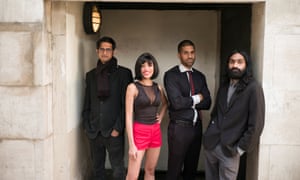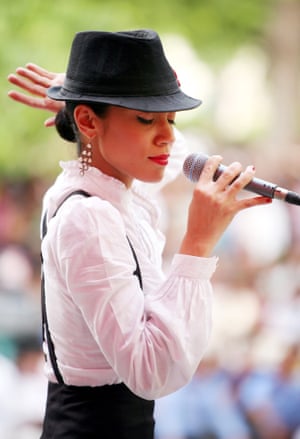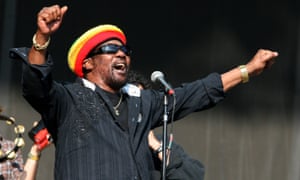
Six years ago a Croydon-born, New Delhi-based keyboard player called Stefan Kaye corralled some local musicians to form a new band. They were, by all accounts, faintly nonplussed by his proposal. “I just never thought it would be possible,” shrugs vocalist Taru Dalmia. “I said to him,” – his voice takes on a slightly incredulous tone – “‘if you can find enough musicians to do this, it’ll be amazing’.”
In Europe or the US, Kaye’s idea wouldn’t have been particularly radical: in the 39 years since the Coventry Automatics changed their name to The Specials and their sound to ska, umpteen bands have opted to play a punk-infused take on the prevalent sound of 1960s Jamaica. In India, however, the formation of the Ska Vengers seems to have been an unprecedented musical event: the scene in New Delhi encompasses everything from hip-hop to heavy metal, but no one seems to have thought of forming a ska band before. “I love ska, I love the ethos of the musicians who played it first, like the Skatalites, but would I ever play in a ska band?” says guitarist Chaitanya Bhalla. “I didn’t think so.”
It isn’t just their music that makes the Ska Vengers a unique proposition: it’s their expressly political lyrics, which, among other topics, take in the territorial divisions in Kashmir, human rights abuses in Manipur, the ongoing, decades-old Naxalite insurgency, and censorship under what the band refer to as the “silent emergency” of rightwing prime minister Narendra Modi.
“There are radical artists who are part of social movements, who have a long tradition of very radical music, like [folk singer and activist] Jiten Marandi, but not rock music and not necessarily in English,” says Dalmia. “For a long time we felt like a lone voice. The kind of indie scene we come from is very middle class. We connected to movements, universities or just places where there are social movements, but otherwise, the music industry spaces we perform in are devoid of politics. But ska and reggae music, it comes from the downtrodden, it has always talked about colonial history and injustice, so if you don’t represent that in some way you’re doing a great disservice to the genre. And then if you sing that music in India, if you don’t connect it to things that are happening in India, it’s a bit off.”

They say that audiences unexpectedly took to their music straight away – “a lot of Bollywood music has a rhythm that’s quite similar to reggae and ska,” says vocalist Samara Chopra, “so they don’t know why they’re grooving to it, but they find it easy to do” – but the Indian media initially attempted to ignore their politics. Early interviews were either fashion-centred – the band are very sharply tailored – or intrigued by the presence of Chopra, a well-known TV anchor and presenter of a show about yoga, in the lineup. A major record label offered them a contract, but only on condition that all references to Kashmir, Manipur and the Naxalites were beeped out of their songs. They elected instead to set up their own label.
Then, during the 2014 election campaign, they released a cover of Dandy Livingstone’s Rudy, A Message To You with lyrics about Modi and his alleged role in the 2002 Gujarat riots that independent sources claim left 2,000 dead. They found that the media were suddenly interested in their politics after all: they were variously labelled as everything from communist sympathisers to Islamists to “anti-national”, a term that Chopra says “is like the word ‘terrorist’ in India at the moment. It’s like a broad, undefined term … if the government want to get you, they’ll label you with it.” They seemed unsurprised by the furore. “Well, it’s not really common for artists to call out our politicians directly by name,” says Dalmia. “It was … gleeful.”
Today, four of the band’s six members are sitting in a publicist’s office on the Strand in central London. Kaye and bass player Tony Guinard are back in India – the former stuck there because of visa problems, which previously earned him a three-month stretch in Delhi’s Tihar jail, the largest prison in south-east Asia. The band subsequently played there, with Kaye welcomed back by the governor “like a guest of honour”, says Chopra, laughing. They are spending the summer in Streatham, south London, playing everywhere from Glastonbury to Glasgow pubs and arousing a considerable degree of curiosity: there is obviously a panoply of music on offer at the UK’s festivals, but it seems fairly safe to say their bills aren’t overburdened with Indian bands performing ska versions of The Velvet Underground’s I’m Waiting For My Man with the lyrics changed to reflect drug abuse among New Delhi’s upper-class rich kids and the East India Company’s role in the 18th-century opium trade.
They are clearly relishing singing Frank Brazil to British audiences. It’s a song about Indian revolutionary Udham Singh who travelled to Britain in 1940 to murder former lieutenant-governor of the Punjab Michael O’Dwyer: “It gives you a little sort of mischievous pleasure,” says Chopra. They seem unconcerned about charges of cultural appropriation levelled at Dalmia’s vocals, which, it’s hard not to notice, are conducted with a distinctly West Indian twang.
“Of course that’s a question that comes up,” he says. “I view it as -aspirational, in the sense that we are all taught to emulate European and American culture – in India right now if you speak with an American accent it’s considered aspirational. But I feel we actually have more to learn from the other former colonies in many ways. Jamaican English is remarkable, because it took a ghetto, underclass English which didn’t have legitimacy and established it as a literary language. It’s incredible, expressive. I feel like I’m a student of it. And you know, if Jamaicans give me props, if Toots Hibbert and Johnny Osborne and Big Youth tell me what I’m doing is good, I don’t really care what other people say. I got taken to meet them in Jamaica by Rory from Stone Love Soundsystem, and that was a moment of approval for me, you know? If you do what you do, you have to be good at it, you know?”
You get the feeling that the odd raised eyebrow about Dalmia’s vocals constitutes fairly small beer compared to the backlash the band might face in India over their lyrics. “People are always asking us, has an anvil dropped on you yet?” says Dalmia. “I know we’re marked. While we were in talks to play at a university called JNU, there was a big controversy there, a lot of students were arrested for sedition and my number was in all their phones. Sure enough, plainclothes police came to my house three days later, asking how I knew them. So we know we’re marked, it’s just a question of whether it is deemed politically expedient to come after us. We’re very privileged because we’re in Delhi, we sing in English, so they’re very careful. But, we’ve had guys from the IB [Intelligence Bureau] at our gigs.”

What’s the worst that could happen? They could stop you performing? “No, that’s not the worst thing that could happen,” says Chopra flatly. “You could get lynched.”
“Some of the media channels are just propaganda, essentially,” says Dalmia. “They can start a hate campaign against you, and it’s not safe to go out any more.”
“What’s happened is the government has emboldened certain forces that perhaps were already existing,” says Chopra, “and things like hate crimes, lynchings and rape are being completely normalised, because the government will not stand up and speak out against them.”
They say they have played gigs in India where people have protested against them: “Trying to shut us down, almost getting violent,” says drummer Nikhil Vasudevan. “We still played, but it was shit-scary.”
“But if you don’t engage with what’s happening or acknowledge what’s happening, you are complicit,” says Dalmia. “ So you’re almost forced to engage. I’m not even sure that what we’re doing helps in any way to affect political realities, but it’s a personal way to cope, because it’s humiliating to not have a response to the stuff that’s happening. To find a way to express yourself and connect with people on stage, where you can embody a kind of more rebellious spirit, and connect with people on that note, it’s a coping mechanism. It gives you some energy back, you know?”
•XX by The Ska Vengers is out now. They play The Duke, Whitstable, 22 July; then touring, including to the WOMAD festival on 30 July.
https://www.theguardian.com/music/2017/jul/20/the-ska-vengers-first-india-ska-band-radical-lyrics-lynched
July 25, 2017 at 4:50 pm
The band, despite all odds, has become popular and promoting the cause of empowerment of down trodden people